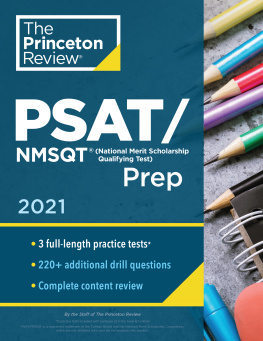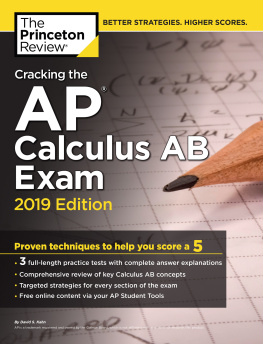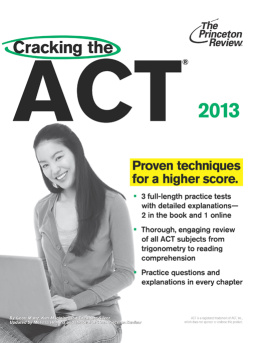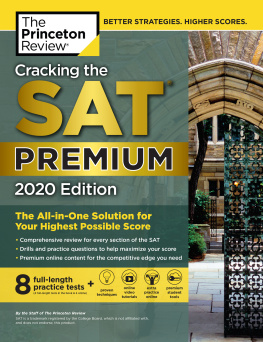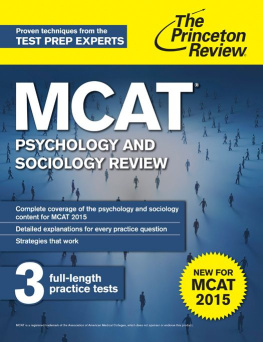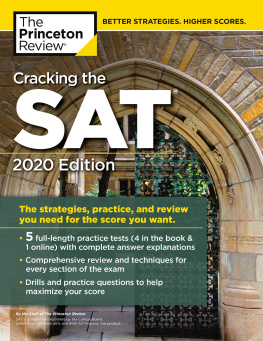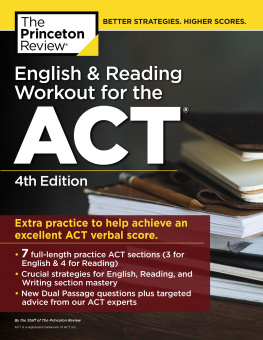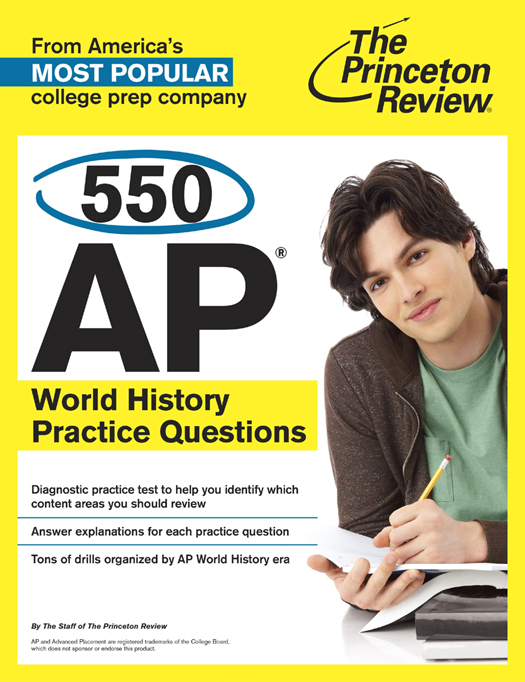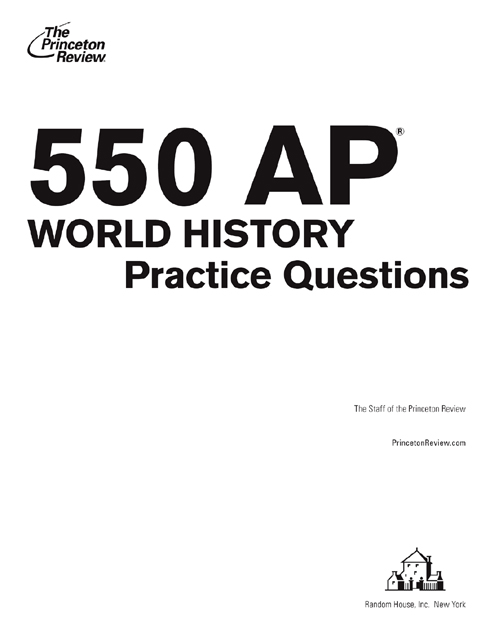
Editorial
Rob Franek, Senior VP, Publisher
Mary Beth Garrick, Director of Production
Selena Coppock, Senior Editor
Calvin Cato, Editor
Kristen OToole, Editor
Meave Shelton, Editor
Alyssa Wolff, Editorial Assistant
Random House Publishing Team
Tom Russell, Publisher
Alison Stoltzfus, Publishing Director
Ellen L. Reed, Production Manager
Dawn Ryan, Managing Editor
Erika Pepe, Associate Production Manager
Kristin Lindner, Production Supervisor
Andrea Lau, Designer
The Princeton Review
111 Speen Street, Suite 550
Framingham, MA 01701
E-mail:
Copyright 2013 by TPR Education IP Holdings, LLC
Cover art Jonathan Pozniak
All rights reserved. Published in the United States by Random House LLC, New York, a Penguin Random House Company, and in Canada by Random House of Canada Limited, Toronto, Penguin Random House Companies.
Poem by Ho Xuan Huong (17721822)
The Weaver of Designs by Bernardino de Sahagun from Florentine Codex, 1577
Excerpt from The White Mans Burden by Rudyard Kipling, 1899
Engraving from the Encyclopedie vol 18. Public domain eighteenth century French engraving.
Excerpt from Nationalism by Sir Rabindrauth Tagore, 1918
Excerpt from Sarojini Naidu, An Indian Nationalist Condemns the British Empire, 1920
Justice, a print by Sir John Tenniel in an issue of Punch Magazine, September 1857
Excerpt from letter written by Syed Ahmad Khan, 1900
Excerpt from The Future of Culture in Egypt by Taha Husayn, 1938
Excerpt from Ahmad Lutfi as-Sayyid, Memoirs, 1963
Excerpt from the Rock and Pillar Edicts of Asoka Maurya (304-232 BC)
Excerpt from Edict of Expulsion of the Jews, 1492
Excerpt The Peace of Westphalia, 1648
Excerpt from The General Act of the Conference of Berlin, 1885
Excerpt from Thomas Paines Rights of Man, 1791
Excerpt from the Balfour Declaration, 1917
Excerpt from Nationalism by Sir Rabindranath Tagore, 1918.
Excerpt from Women In Asia: Restoring Women to History by Barbara N. Ramusack and Sharon Sievers. Indiana University Press, 1999
Excerpt from Chinese Women Yesterday and Today by Florence Ayscough. Published by Jonathan Cape, London, 1938.
Page from Ling Long womens magazine, published in Shanghai from 1931 to 1937.
The Examples by Nguyen Quang Thieu from The Women Carry the River Water: Poems, 1997.
Excerpt from The New Vietnam by Phan Boi Chau, 1907
Statement by Le Duan at The Vietnamese Womens Fourth Congress, 1974
eBook ISBN: 978-0-8041-2444-7
Trade Paperback ISBN: 978-0-8041-2441-6
The Princeton Review is not affiliated with Princeton University.
AP and Advanced Placement Program are registered trademarks of the College Board, which does not sponsor or endorse this product.
Editor: Selena Coppock
Production Editor: Kathy Carter
Production Artist: Craig Patches
v3.1
Acknowledgments
The Princeton Review would like to give thanks to Merav Ceren, Cynthia Cowan, Danny Poochigian, and Chris Stobart for their hard work and dedication to the development and release of this book.
Contents
Part I
Using This Book
to Improve Your
AP Score
PREVIEW: YOUR KNOWLEDGE, YOUR EXPECTATIONS
Your route to a high score on the AP World History Exam depends a lot on how you plan to use this book. Start thinking about your plan by responding to the following questions.
- Rate your level of confidence about your knowledge of the content tested by the AP World History Exam:
- Very confidentI know it all
- Im pretty confident, but there are topics for which I could use help
- Not confidentI need quite a bit of support
- Im not sure
- If you have a goal score in mind, circle your goal score for the AP World History Exam:

- What do you expect to learn from this book? Circle all that apply to you.
- A general overview of the test and what to expect
- Strategies for how to approach the test
- The content tested by this exam
- Im not sure yet
YOUR GUIDE TO USING THIS BOOK
This book is organized to provide as muchor as littlesupport as you need, so you can use this book in whatever way will be most helpful for improving your score on the AP World History Exam.
- The remainder of will provide guidance on how to use this book and help you determine your strengths and weaknesses, plus a diagnostic test, so you can see what areas you should focus on in your AP World History review.
- of this book will
- provide information about the structure, scoring, and content of the AP World History Exam.
- help you to make a study plan.
- point you towards additional resources.
- of this book will explore various strategies:
- how to attack multiple-choice questions
- how to write effective essays
- how to manage your time to maximize the number of points available to you
- contains a final chapter that is comprised entirely of practice essays. We also provide detailed explanations and scoring rubrics for these practice essays.
You may choose to use some parts of this book over others, or you may work through the entire book. Your approach will depend on your needs and how much time you have. Lets now look at how to make this determination.
HOW TO BEGIN
- Take a Test
Before you can decide how to use this book, you need to take a practice test. Doing so will give you insight into your strengths and weaknesses, and the test will also help you create an effective study plan. If youre feeling test-phobic, remind yourself that a practice test is a tool for diagnosing yourselfits not how well you do that matters but how you use information gleaned from your performance to guide your preparation.
So, before you read further, take the AP World History Diagnostic Test starting on of this book. Be sure to do so in one sitting, under realistic testing conditions, following the instructions that appear before the test. - Check Your Answers
Using the answer key on , count how many multiple-choice questions you got right and how many you missed. Dont worry about the explanations for now, and dont worry about why you missed questions. Well get to that soon. - Reflect on the Test
After you take your first test, respond to the following questions: - How much time did you spend on the multiple-choice questions?
- How much time did you spend on each free response question?
- How many multiple-choice questions did you miss?
- Do you feel you had the knowledge to address the subject matter of the essays?
- Do you feel you wrote well-organized, thoughtful essays?


